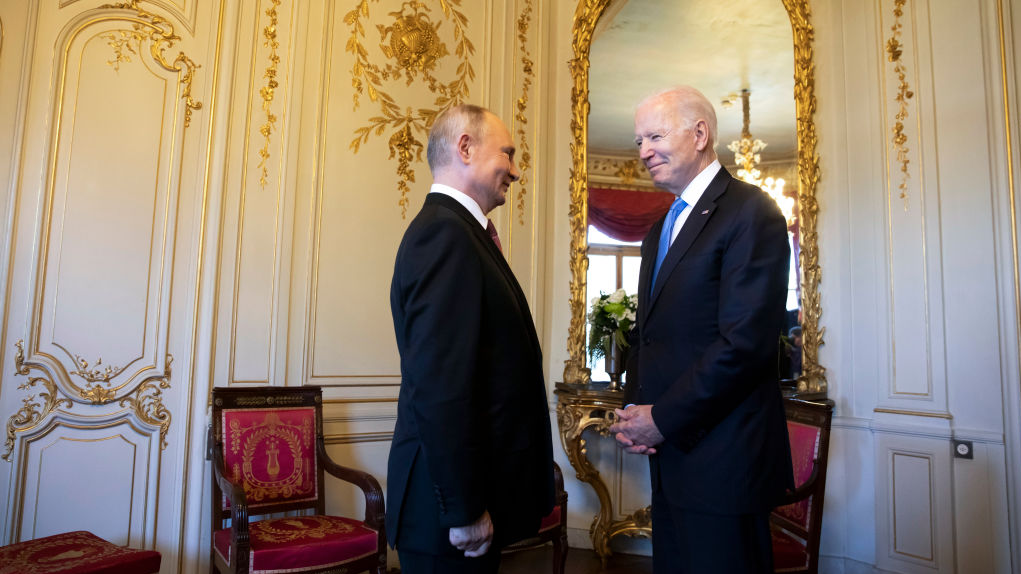
Editor's note: Hannan Hussain is a foreign affairs commentator and author. He is a Fulbright recipient at the University of Maryland, the U.S., and a former assistant researcher at Islamabad Policy Research Institute. The article reflects the author's opinions and not necessarily the views of CGTN.
On July 9, a last-minute compromise between Russia and the United States prompted the United Nations Security Council (UNSC) to reauthorize a critical cross-border humanitarian aid operation into Syria, guaranteeing aid access into the country's northwest via Turkey for another six months, with an anticipated extension on the cards.
"For the first time Russia and the U.S. not only could agree but elaborate a consolidated draft resolution that found support with all our colleagues in the council," remarked Vassily Nebenzya, Russian Ambassador to the United nations (UN). "Hopefully, this kind of scenario will be a turning point that not only Syria and the Middle East, but the entire world will benefit from," he added.
U.S. and Russia's apparent success in backing the cross-border aid extension – despite competing views on aid routes' territorial sensitivities – gives teeth to Biden and Putin's discussion on Syria during their Geneva summit.
Most importantly, by advancing some semblance of convergence at the council on hotly debated Syria, both countries leave member states better prepared to blunt some of the devastating implications of cross-border aid inaction, as warned by the UN chief weeks in advance.
First, the council's unanimously adopted resolution on extending cross-border humanitarian aid access represents the first-ever instance where an improvement in "cross-line aid deliveries" into Syria is emphasized. Cross-line aid can be thought of as assistance that passes through a domestic frontline in Syria, and proceeds towards areas beyond the government's control.
The newly underlined cross-line aid delivery priority thus signals the potential for a more calibrated council approach to humanitarian assistance in Syria. Especially when lifesaving support for over 3.4 million civilians is kept from being hamstrung by reservations surrounding violations of Damascus' territorial and sovereign integrity – a sentiment intensified through Washington's changing defense for controversial humanitarian aid access points, and its staunch advocacy for unilateral regime sanctions.
Note that sensitivities to Syria's territorial and sovereign bonds stood activated when the council took exception to much-needed activism on cross-line aid in the recent past. Instead, it remained overwhelmingly focused on a "cross-border mechanism" approach that calls for urgent replacement.
What made the latter mechanism controversial and ill-coordinated was its perceived lack of regard for vital distinctions between areas within Damascus' control, and those beyond it. This difference is important because once internationally mobilized UN aid begins to appear soft on Syria's sovereignty, the latter's hard-won counterterrorism gains risk being put on ice.
The other cost is the long-term benefit that undistinguished and poorly monitored aid can afford to contend rebel groups within Syria: indirectly supporting their quest for a global legitimacy narrative within the country's complex landscape of internal unrest.

U.S. President Joe Biden (R) and Russian President Vladimir Putin meet during the U.S.-Russia summit at Villa La Grange in Geneva, Switzerland, June 16, 2021. /Getty
U.S. President Joe Biden (R) and Russian President Vladimir Putin meet during the U.S.-Russia summit at Villa La Grange in Geneva, Switzerland, June 16, 2021. /Getty
Biden and Putin's summit in Geneva last month lent recognition to possible U.S.-Russia cooperation on Syria, which could blunt the challenges of joint inaction. Now, their last-minute determination to keep the UN's Syria aid operation mandate from expiring not only falls in line with those very discussions; it ends the council's own multiyear gap vis-à-vis united humanitarian relief leadership on Syria.
Interestingly, Friday's vote also carries a strategic lesson. Washington's view that the final compromise resolution signifies common ground with Russia, has guidance on how the council ought to proceed on the Syrian humanitarian crisis in the near future: by circumventing the politics of competing aid resolutions altogether.
Part of this politics was captured by Washington's initial support for a so-called Western resolution aimed at extending the Syrian aid operation mandate by twelve months straight, effectively breaking with Russia's more calibrated proposal to back a shorter extension period on its merits.
What the U.S. approach ignored was the degree to which Moscow's proposal aligned with the Secretary General's substantive report on operational transparency, and a progress review of cross-line aid access once assistance heads for millions of Syrian citizens in need.
Thus understood, the fact that Russia's core suggestions were amply reflected in Friday's adopted resolution confirms a simple fact: that the council must demonstrate unanimity on one of the world's most complex geopolitical terrains by ensuring all its permanent member states – including the U.S. – judge resolutions based on strategic reasoning, not by operating in lockstep with a predetermined relief aid counterweight that implies ideological weight.
"It (the adopted resolution) shows what we can do with the Russians if we work with them diplomatically on common goals," said U.S. Ambassador to the United Nations Linda Thomas-Greenfield on Friday.
To that end, the process that went on to define Russia-U.S. convergence on Friday's UNSC vote will have to evolve beyond a last-minute compromise to suit the broader institutional unity that the council envisions on Syria.
(If you want to contribute and have specific expertise, please contact us at opinions@cgtn.com.)

